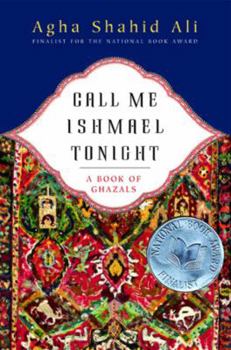Call Me Ishmael Tonight: A Book of Ghazals
Select Format
Select Condition 
Book Overview
"Ali's ghazals are contemporary and colloquial, deceptively simple, yet still grounded in tradition....Highly recommended."--Library Journal
Format:Paperback
Language:English
ISBN:B0091Z4AII
ISBN13:9780393326123
Release Date:October 2004
Publisher:W. W. Norton & Company
Length:87 Pages
Weight:0.30 lbs.
Dimensions:0.3" x 5.6" x 8.2"
Related Subjects
PoetryCustomer Reviews
2 ratings
verses that continue to burn with life
Published by Thriftbooks.com User , 19 years ago
Reviewed by Summer Lopez for Small Spiral Notebook Call Me Ishmael Tonight was published in 2003, two years after author, Agha Shahid Ali died of brain cancer. You don't need to know this before you read his lovely collection of ghazals, but it does make these graceful verses all the more powerful to know they were written in the shadow of eternity: "Even Death won't hide the poor Fugitive forever; / on Doomsday he will learn he must live forever." The ghazal is an ancient Persian form of poetry, and Ali uses this traditional structure to his advantage in contemplating modern life. Within the strict schema of the verse, Ali finds space to stretch his impressive linguistic muscles. In language that is both playful and elegant, timely and timeless, Ali constructs beautiful poems which are clearly the voice of a man looking back on his life with wisdom and humor. The construction of the ghazal involves the use of a repeated rhyme followed by a refrain, usually one word or a short phrase, which Ali also uses as the title of each poem. This format creates a sense of suspense not often found in poetry, leaving you wondering how each couplet will end and whether it will make you laugh, cry, or merely wonder at his creativity. Can you possibly not love a poet who rhymes "Guggenheim" with "paradigm" and "Le Chaim?" The poems' refrains-"Arabic," "water," "bones," "by exiles," "of light" and "God," to name a few-guide us through lines packed with allusions to the Koran, Borges, and Rushdie. And at the end of many poems, Ali works in his own name, like the shadow of a ghost, leaving us to wonder who he truly wishes to address when he asks, "You've forgiven everyone, Shahid, even God- / Then how could someone like you not live forever?" Perhaps he could not, but thankfully, his verses continue to burn with life.
Poetry at the crossroads of cultures
Published by Thriftbooks.com User , 20 years ago
"Call Me Ishmael Tonight: A Book of Ghazals," by Agha Shahid Ali, is a truly distinctive addition to American poetry. The "About the Author" section notes that Ali was a Kashmiri-American who was born in New Delhi and held a number of academic posts in the U.S. before his death in 2001. A short note on the ghazal briefly describes the history and structure of this poetic form.Each ghazal is made up of a series of couplets. In general the second line of each couplet repeats a rhyme and refrain (with the first couplet of the series using this rhyme and refrain in both lines). For example, the poem "By Exiles" ends three sample lines "...torn wild by exiles," "...compiled by exiles," and "...beguiled by exiles." At first I found the book hard to warm too. The ghazal structure itself struck me as distracting; the form seemed to call too much attention to itself and to overwhelm the content. But I found repeated readings to be rewarding and illuminating.Ali has a vision with a remarkable multicultural sweep. Woven into the ghazals are many references--Lorca, Oscar Wilde, "The Satanic Verses," Apollo, Pocahontas, Bartleby, Borges, etc. There is a lot of religious material in the poems also, at times making it feel like some boldly contemporary scripture. Other important themes are death, loss, and language.At times the book has an irreverent or satiric flavor. It is filled with some astonishing imagery. Ultimately "Call Me Ishmael" reads like a meeting place of cultures. At times hypnotic, surreal, apocalyptic, chaotic, ironic, cryptic, and tragic, it's a work of haunting beauty.






